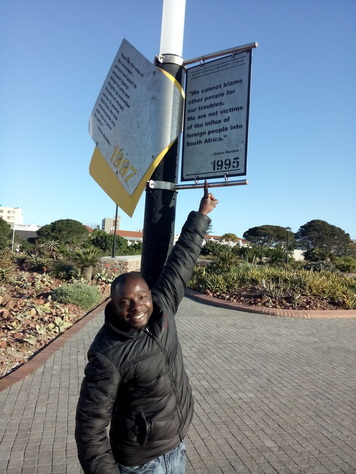 A Ghanaian teacher pointing to Mandela's quote while leaving South-Africa due to recent xenophobia A Ghanaian teacher pointing to Mandela's quote while leaving South-Africa due to recent xenophobia Just returning from a two week visit to South-Africa and Ethiopia I cannot help but reflect on the recently published UN report on discrimination in The Netherlands. For the Dutch the report has already been ridiculed due to its connection to a folk tradition of having St. Nicolas and his many black Peters visiting the Netherlands with their boat from Spain handing out presents to children who have behaved that year. A great way to keep your children in check as punishment (up to being deported to Spain) is connected to bad behavior. All your deeds are listed in the Big Book. And when you have done well you might receive sweets and presents given to you by the always jolly Black Peters. For years this festival was treasured and the spell was only broken at an age your elder brother or sister no longer could keep the secret that everything is fake. Or possibly your faith in Saint Nicolas will be shipwrecked the moment you recognize your dad or another acquaintance to be wearing the Saints cloths and a long white beard attached. Or the moment you discover black peter having a voice that sounds as nice as your mother’s. However, with the Caribbean being part of the Kingdom and few of its youth having been yelled at as Black Peters, once ‘mature’ their wrath is certain. Everybody will know that they were hurt. As a consequence this innocent children festival now has been jeopardized by adult interference on account of a UN convention against all forms of racial, religious and ethnic discrimination. Should the objections to the festival be taken that serious as they have now by those arguing against it? Does the festival cause people to look down on others or encourage children to discriminate? The few exceptions left alone I would argue the festival even is a celebration of diversity and makes children not to fear people who look different but possibly also expect good things of them. One thing is for sure the festival as much equalizes men and women as well as adults and children while celebrating the party together and making fun of each other through poems that go along with the presents. Often the mums and dads are not exempted from being challenged on their good and bad behavior by their grown-ups. In analyzing this particular case I realized, nothing has changed with the festival, neither has discrimination increased as a result thereof. However, the context in which it is celebrated has changed dramatically. The world is overwhelmed by discrimination of all sorts and the rights of minority groups are trampled. The quest in the Netherlands to blame ‘Saint Nicolas and Black Peter’ is just a reflection of a global struggle where the voice of minorities is gradually silenced. Hence demonstrations of the right to be different (whether it is by taking part in a gay pride or not or by wearing religious symbols in public offices) are increasing as the pressure is mounting to conform to the majority and suppress individuality. A reduction in opportunities for human development as well as employment possibilities causes an increase in nationalism (own people first) and a drive to expel anything that is different or is not part of the familiar. I witnessed this in South-Africa where Ghanaian teachers no longer wish to serve at South-African schools as cases of xenophobia were amplified to start a national campaign against xenophobia while simultaneously many legal and illegal immigrants were harassed to prove their contribution to society. I witnessed this in Ethiopia where human development has fallen victim to political considerations. I witness this at home where refugees are framed by right-wing politicians as people who only aim at our resources, notwithstanding the fact that we have done the same for ages. Boarding the plane going home I was happy to learn from Sundays newspaper that a Dutch women Daphne Schippers won the 200 m at Beijing’s World Championships Athletics. While contemplating her great achievement and feeling a proud Dutchman, watching her successful run over and over again, I just wondered myself if it equaled my concern about the Somali Olympic runner Samia Yusuf Omar who probably lost her life at the Mediterranean this same week.
0 Comments
Your comment will be posted after it is approved.
Leave a Reply. |
About meMy name is Reinier van Hoffen. U®Reading
Click here for a summary.
Also find the text of a lecture Dr. Achterhuis held at the 2012 Bilderberg conference. Archives
August 2022
|
AddressNachtegaallaan 26
Ede, the Netherlands |
Telephone+31 (0)6 1429 1569
|
info@uraide.nl
|
 RSS Feed
RSS Feed
















